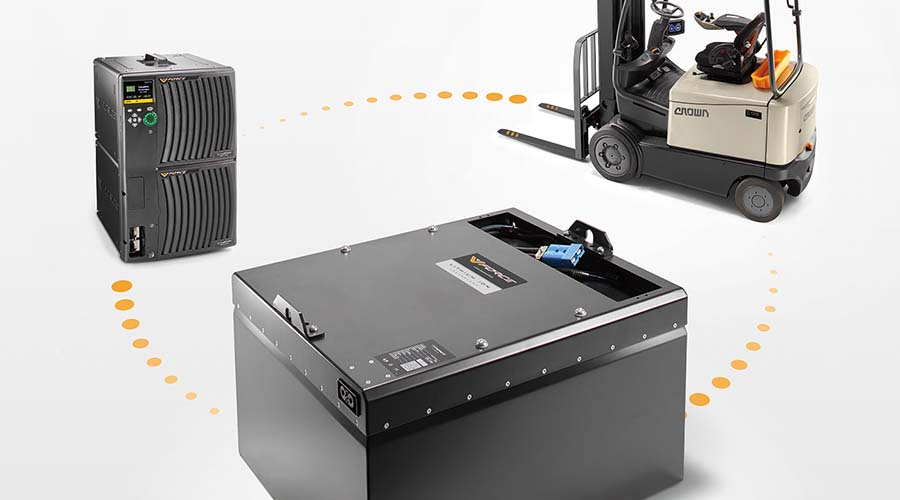Welcome to Upright Forklift Repair, where expertise meets reliability right in the heart of Houston and Humble, Texas. Specializing in repairing, servicing, and providing high-quality spare parts for forklifts, we’re dedicated to keeping your operations running smoothly. As technology evolves, so does the way we power our fleets.

This brings us to an important question: “Lithium ion batteries—are they right for your fleet?” This discussion will delve into the world of lithium ion versus traditional lead acid batteries, offering you insights to make informed decisions for your material handling equipment.
Understanding Lithium Ion Technology in Material Handling
Lithium ion batteries represent a significant leap forward in battery technology, especially for demanding applications like forklift operations. Unlike their lead acid counterparts, lithium ion batteries provide higher energy density, longer run times, and require minimal maintenance.
This technology supports faster charging times and reduced operational disruption. By comparing these modern solutions to traditional lead acid batteries, it’s clear that lithium ion offers improved efficiency and sustainability. Such advantages are crucial for businesses aiming to boost productivity and reduce downtime in their day-to-day operations.
Benefits of Lithium Ion Batteries for Forklift Fleets
Choosing lithium ion batteries for your forklift fleet introduces a range of benefits. Firstly, the longer lifespan of lithium batteries ensures that they outlast traditional lead acid batteries, making them a more cost-effective solution in the long run.

Additionally, the higher energy density means that these batteries can store more power, enhancing the efficiency of how trucks operate, even in demanding environments like cold storage or busy distribution centers. Lithium ion batteries are virtually maintenance-free, which eliminates the need for frequent checks and services.
This aspect alone can significantly increase operational productivity and reduce costs associated with battery maintenance and replacement. When comparing lithium ion with lead acid solutions, the benefits extend beyond just performance to encompass significant operational improvements across various warehouse and distribution scenarios.
Practical Considerations for Lithium Batteries in Forklifts
When integrating lithium ion batteries into your fleet, several practical aspects must be considered. Battery life with lithium ion technology tends to be longer, but it’s important to choose the right charger size to match the battery capacity, ensuring efficient charging cycles.
Additionally, transitioning to lithium ion batteries may reduce the need for special battery rooms designed for lead acid battery maintenance, thereby saving space and reducing infrastructure costs.
Safety is paramount, hence implementing robust training and safety programs specific to lithium ion battery handling is crucial. These programs help mitigate risks and educate your team on the proper procedures, ensuring a safe and productive work environment.
Cost Analysis: Lithium Ion vs. Lead Acid Batteries
The initial cost of lithium ion batteries is generally higher than that of traditional lead acid batteries. However, the long-term savings, derived from their longer lifespan and minimal maintenance requirements, can offset the upfront investment.
Lithium batteries also contribute to increased productivity due to less downtime and faster charging. Fleet managers must weigh these potential trade-offs by considering the specific operational needs of their equipment.
An operational needs assessment can help determine whether the higher energy density and efficiency of lithium ion batteries justify the initial expense, ultimately leading to cost savings and improved fleet efficiency.
Lithium Forklift Batteries: A Total Solutions Provider
Lithium ion batteries offer a comprehensive solution for modern material handling equipment. As a total solutions provider, lithium ion technology supports not just single battery configurations but also setups involving multiple batteries, allowing for scalability and flexibility in energy management.
This adaptability ensures that forklifts can achieve longer run times with consistent power, which is essential in high-demand environments such as distribution centers and manufacturing facilities.
By embracing lithium ion batteries, companies can enhance their operational efficiency, reduce environmental impact, and improve the overall energy management within their logistics and material handling operations, demonstrating the true value of transitioning to advanced battery technologies.
Making the Right Choice for Your Fleet
Selecting the right power source for your fleet requires careful consideration. Lift truck fleet managers should ask: How will lithium ion technology meet our operational needs? What are the long-term cost implications? These key questions can guide the decision-making process effectively.
Call to Action: Partner with Upright Forklift Repair
As we’ve explored, lithium ion batteries offer numerous advantages, including longer lifespans, minimal maintenance, and significant efficiency improvements, helping operators inspect their forklifts for safety. These benefits highlight why lithium ion is a practical alternative power source for your fleet.
Ready to enhance your fleet’s efficiency and safety with the latest in battery technology? Contact Upright Forklift Repair today. Our team in Houston and Humble is eager to provide you with customized solutions and expert advice. Partner with us and take the first step towards a more productive and sustainable operation.
